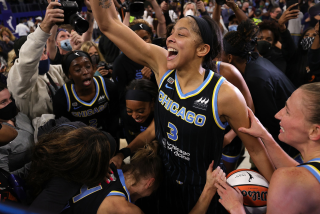TV REVIEW : ‘Karen Carpenter Story’: Close to Her
“The good die young . . .”
That’s something the pop-music press liked to say about their fallen heroes during the ‘70s, but Karen Carpenter was the last star they had in mind.
To start with, the critics didn’t think the Carpenters were any good. “Bubbly and bland” is how “The Rolling Stone Record Guide” still describes them, and that seemed to be the critical consensus during the heyday of the brother/sister duo in the ‘70s. And no one expected Karen to die young.
Despite the pundits, many fans found something magical about the incredibly textured, curiously dispassionate yet deeply affecting voice that sang such classic pop songs as “Close to You” and “We’ve Only Just Begun.”
Otherwise, it seemed like the press was right: The sweet, unglamorous singer from Downey appeared to be the antithesis of the typical rock star. She shunned the spotlight, dressed poorly and lived with her parents into her 20s (moving out only to share a house with her brother and musical partner Richard).
But Karen Carpenter was more interesting, more troubled and more talented than most people thought. The protagonist of “The Karen Carpenter Story” (Sunday at 9 p.m. on CBS Channels 2 and 8) is as enigmatic and fascinating in her own way as some of the most rebellious live-hard-die-young stars.
Carpenter had her energy--channeled to some extent into her love for playing the drums--but somehow that energy became repressed and perhaps misrouted. As a singer, however, she was quietly marvelous and intriguing, and so is this respectful yet revealing TV movie biography.
Revelations are the last thing many viewers might expect from “The Karen Carpenter Story,” once they see that the film was made with cooperation of family and friends. Amazingly, the movie doesn’t pull punches--in fact, it delivers a couple that are going to stun fans of the popular duo.
Besides detailing Karen’s anorexia nervosa--the severe dieting eating disorder that probably led to the weakening and eventual failure of her heart five years ago at age 32--the movie also confronts Richard’s Quaalude addiction (something he made public only during the making of the film) and a home atmosphere where there was more of an emphasis on perfection than on affection.
Also, “The Karen Carpenter Story” offers some compelling implications--among them that Karen was so attached to Richard that she was jealous of his girlfriend.
This point and several others are left vague in the film, but they are established in such a beautifully and subtly crafted way by writer Barry Morrow, director Joseph Sargent and a fine cast that they captivate rather than frustrate.
Captivating, too, is the generous use of the Carpenters’ original recordings, convincingly mouthed by Cynthia Gibb who plays Karen (she and Louise Fletcher as Karen’s mother give superb performances). But “The Karen Carpenter Story” has other moments, rich in subdued irony, that are just as incredible as the songs.
It provides insight into how the most seemingly squeaky-clean segments of our society can be troubled by addiction and other psychological difficulties. It shows us how caring parents can cause harm if the care is not demonstrative. And it portrays pop stars without glorifying them or making their moments of anguish melodramatic.
Several scenes are marvelous. Just one: Richard (who is played by Mitchell Anderson) is watching TV (the brother-saves-brother scene from “It’s a Wonderful Life”) late at night. His mother enters the room and asks why he’s still up. When he complains of restlessness, she says she has just the thing, sounding like a TV commercial. As she leaves the room to fetch the cure, a bank ad comes on TV. Richard is fascinated by the music in the commercial (it would later become the group’s hit “We’ve Only Just Begun”) and mom returns with something to help him sleep--a Quaalude!
“The Karen Carpenter Story” has a lot more going for it: a daring opening scene that has an image of a teen-age Karen looking down on her dead body, a record producer mocking the words of “Close to You” (followed by Richard’s exquisite arrangement), a superbly chosen score that includes not only the hits but less-known triumphs such as (over shots of Karen’s failed marriage) the outstanding version of “This Masquerade” the duo recorded three years before George Benson had a hit single with it.
This is a brave and haunting work; it does not fully explain a compelling and underrated artist, but offers some valuable clues into how to prevent another tragedy like hers.
More to Read
The complete guide to home viewing
Get Screen Gab for everything about the TV shows and streaming movies everyone’s talking about.
You may occasionally receive promotional content from the Los Angeles Times.






